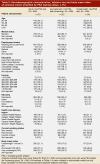Factors related to use of prostate cancer screening: the Alberta Tomorrow Project
- PMID: 20101288
- PMCID: PMC2801912
Factors related to use of prostate cancer screening: the Alberta Tomorrow Project
Abstract
Background: Very few data are available on the determinants of PSA testing in Canada, and it is a matter of debate whether prostate-specific antigen (PSA) screening in asymptomatic men age 50 and older with no risk factors for prostate cancer is useful. If PSA screening is introduced into the periodic health examination, it will be important to know what factors influence its use.
Objectives: The purpose of this study is to determine the factors associated with PSA testing among asymptomatic men age 50 and older participating in the Tomorrow Project in Alberta.
Methods: The Tomorrow Project is a population-based cohort study with over 11,000 participants accrued in Alberta since February 2003. Information was collected on medical history, sociodemographic factors, health status and lifestyle characteristics. This analysis includes 2136 men 50 years of age and older. The independent association between various factors and recent PSA screening is estimated using logistic regression.
Results: Approximately 50% of of the study group had received one or more PSA tests in their lifetime. Of these, 58% were asymptomatic for prostate disease at the time of their most recent PSA test. Variables independently associated with recent PSA screening for prostate cancer in this population include older age (>/= 65 versus < 55 years: adjusted odds ratio [OR] 2.60; 95% confidence interval [CI] 1.77-3.83), higher income (>/= $80,000 versus < $20,000, OR 1.97; 95% CI 1.09-3.55), region of health care delivery, perception of health status (good versus excellent health status; OR 0.65, CI 0.43-0.96], increased number of chronic health conditions (OR 1.73, 95% CI 1.10-2.71), and history of colorectal cancer screening with fecal occult blood test (OR 2.21; 95% CI 1.73-2.83).
Conclusions: An increasing proportion of men in Alberta are receiving a PSA test. A number of significant predictors of having a PSA test were identified, suggesting that factors other than having a clinical indication for prostate disease can influence decisions about PSA screening.
Conflict of interest statement
Competing interests: None declared.
Figures






References
-
- Canadian Cancer Society Early detection and screening for prostate cancer. 2006. [accessed 2007 Mar 9]. http://www.cancer.ca/ccs/internet/standard/0,3182,3172_10175_74550606_la....
-
- Kopec Jacek A, Goel Vivek, Bunting Peter S, Neuman Jan, Sayre Eric C, Warde Padraig, Levers Peter, Fleshner Neil. Screening with prostate specific antigen and metastatic prostate cancer risk: a population based case-control study. J Urol. 2005 Aug;174(2):495–9. doi: 10.1097/01.ju.0000165153.83698.42. discussion 499. - DOI - PubMed
-
- Labrie Fernand, Candas Bernard, Cusan Lionel, Gomez Jose Luis, Bélanger Alain, Brousseau G, Chevrette Eric, Lévesque Jacques. Screening decreases prostate cancer mortality: 11-year follow-up of the 1988 Quebec prospective randomized controlled trial. Prostate. 2004 May 15;59(3):311–318. doi: 10.1002/pros.20017. - DOI - PubMed
-
- Horninger Wolfgang, Berger Andreas, Pelzer Alexandre, Klocker Helmut, Oberaigner Wilhelm, Schönitzer Dieter, Severi Gianluca, Robertson Chris, Boyle Peter, Bartsch Georg. Screening for prostate cancer: updated experience from the Tyrol study. Can J Urol. 2005 Feb;12 Suppl 1:7–13. discussion 92-3. - PubMed
LinkOut - more resources
Full Text Sources
Research Materials
Miscellaneous
